Framed

Brief Synopsis
Cast & Crew
Richard Wallace
Glenn Ford
Janis Carter
Barry Sullivan
Edgar Buchanan
Karen Morley
Film Details
Technical Specs

Synopsis
Soon after mining engineer Michael Lambert takes a job as a truck driver in a small town, he loses control of his truck and crashes it into an automobile. The accident results in the owner of the damaged car, miner Jeff Cunningham, taking Michael to court. Just as Michael receives a ten-day jail sentence, though, a mysterious stranger, barmaid Paula Craig, steps forward to pay his bail. Upon his release, Michael goes to the La Paloma Café, where Paula works, and he drinks until he becomes unconscious. Noticing that Michael bears a resemblance to bank vice-president Stephen Price, a married man with whom she is having an affair, Paula decides to use him in their scheme to embezzle $250,000 from Stephen's wife. As part of Paula and Stephen's plan, Michael's "accidental" death will be made to appear as that of Stephen's so that a police investigation will be averted. Soon after he awakens from his drunken stupor, however, Michael is hired by Jeff, who has struck a vein of rich soil, and makes plans to leave town. Later that day, when Paula learns about Michael's job offer, she calls Stephen and instructs him to thwart Jeff's loan deal so that Michael cannot start his new job. Stephen then puts the first part of the embezzlement scheme into place when he places $250,000 of his wife's money in a safety deposit box in his bank, under Paula's name. Stephen and Paula then rehearse the rest of the plan by driving to the cliffside location where, at right moment, Paula, sitting in the backseat of the car, will strike Michael on the head with a wrench. The car will then be sent over the cliff to make it appear as if Michael had died in an accident. When the time comes for the actual murder to take place, though, Paula, seeing that Michael has drunk himself unconscious again, carries out her own scheme and kills Stephen instead. Later, when Stephen's autopsy report shows that he was killed by a blow to the head received before his car went over the cliff, Paula succeeds in convincing Michael that he killed Stephen in a drunken brawl. Although Michael is prepared to confess to a murder that he does not remember committing, Paula insists that he keep quiet about it for fear that she will be implicated. Michael soon begins to suspect that Paula killed Stephen when he learns from Jeff, who has been arrested for the murder, that his loan was quickly denied when Stephen received a strange phone call. Michael vows to get Jeff released within a day and begins searching for evidence to prove that Paula is the real killer. This he accomplishes with a clue about the phone call from Stephen's secretary. Now certain that Paula killed Stephen, Michael sets a trap for her at the safety deposit box where the stolen money is stashed, and she is caught red-handed trying to retrieve it.

Director
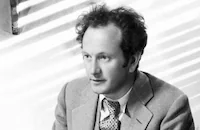
Richard Wallace
Cast
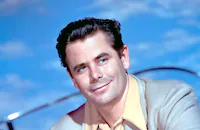
Glenn Ford

Janis Carter

Barry Sullivan

Edgar Buchanan

Karen Morley
Jim Bannon
Sid Tomack
Barbara Wooddell
Paul Burns
Charles Cane
Art Smith
Robert Stevens
Lillian Wells
Fred Graff
Michael Towne
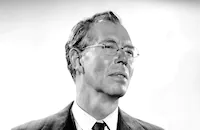
Walter Baldwin
Eugene Borden
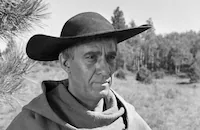
Martin Garralaga
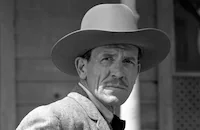
Kenneth Macdonald
Crane Whitley
Alan Bridge
Snub Pollard
Jack Baxley
Stanley Andrews
David Fresco
Mabel Smaney
Gene Stutenroth
Cecil Weston
Harry Stang
Cy Malis
Nacho Galindo
William Stubbs
Mel Wixson
Crew
Carl Anderson
Fay Babcock
Sidney Clifford
George Cooper
Richard Fantl
Stephen Goossón
Burnett Guffey
Jean Louis
Ben Maddow
Wilbur Menefee
Jack Patrick
Jules Schermer
Marlin Skiles
M. W. Stoloff
Herman Webber

Photo Collections
Videos
Movie Clip




Hosted Intro
Film Details
Technical Specs

Articles
Framed (1947)
Filmed as They Walk Alone, Richard Wallace's Framed (1947) was a bid by Columbia to repeat their success with Gilda (1946), in which cool and collected Ford had been paired with a smoldering Rita Hayworth, while twitchy George Macready stole the show as Hayworth's gimpy third wheel of a husband. Playing the part of the femme fatale in Framed was Janis Carter. Born Janis Dremann in 1913, Carter moved to New York after her graduation from Cleveland, Ohio's Mather College with the hope of an opera career. Thwarted in that dream, she was discovered by Daryl F. Zanuck while working as a model for the John Robert Powers Agency. Signed by Fox, Carter felt underutilized and broke her contract (with the consent of the studio) to try her luck at Columbia. A role in Night Editor (1946), in which her character exhibits sexual stimulation at the scene of a violent assault, won her the bad girl role in Framed. Ford (at the time, "Man of the Year" according to the Bobbysoxers of America) and Carter ("Motion Picture Sweater Girl" of 1946, by power of the National Knitted Outerwear Association) got along well during shooting but for the damage to Carter's alabaster skin from Ford's required five o'clock shadow. When the actress broke out in a rash, Ford was ordered to shave and his stubble was stippled on thereafter by the make-up department. Another amusing incident occurred when aircraft buzzed the Columbia Ranch where exterior scenes were being shot. With the sound of plane motors ruining take after take, Ford aimed a string of invectives at the heavens, prompting one crewman to crack "You invented the darn things, didn't you" - a reference to Ford's role as John J. Montgomery, inventor of the "aeroplane," in Gallant Journey (1946).
However Columbia may have wanted lightning to strike twice (one sheets for Framed assured moviegoers that this was "the same Ford who tamed Gilda"), the romantic triangle of Ford, Carter and Barry Sullivan hadn't quite the same potential for psycho-sexual magnetism. Critics were divided upon the occasion of the film's theatrical release in April of 1947 (at which time it was booked for play dates at the Pantages Hollywood and the RKO Hillstreet with George Archainbaud's King of the Wild Horses, starring Preston Foster) but even the naysayers were largely in agreement that Ford was the one to watch. "Ford shows distinct progress in the potency of his portrayals since his return from the service," wrote Edwin Schallert of the LA Times, while The Hollywood Reporter's Gene Friedman observed "Ford is excellent in a Bogart-like role and adds to it flashes of boyish personality that lift his portrayal well out of the groove." The critic for Film Daily found Ford "...well cast. The way they (audiences) want to see him" while also noting that Janis Carter was "very easy on the optics." The critics were less forgiving of the film's debt to previous noirs, from Gilda to Double Indemnity (1944). One wag went so far as to suggest that the makers of Framed owed James M. Cain a royalty check. Ultimately, this project was neither a high or low point in the arc of Glenn Ford's Hollywood career. Several important film roles lay ahead of him, including the male second lead (opposite Marlon Brando) in MGM's film of John Patrick's Pulitzer prize-winning Broadway play The Teahouse of the August Moon (1956).
Coincidentally, it had been an unpublished story by John Patrick that set the ball rolling on Framed. Hired to flesh out the tale for the movie was another writer, Ben Maddow. Born in Passaic, New Jersey, in 1909, the Columbia graduate worked during the Depression as an orderly at Bellevue Hospital and as a social service investigator; the latter vocation brought him daily into Manhattan's teeming immigrant slums. A passion for cinema pointed Maddow to an early affiliation with a Marxist documentary film group and he became a founder of the leftist newsreel The World Today. During World War II, Maddow was assigned to the Air Force First Motion Picture Unit, alongside John Sturges, William Wyler and Marvin Wald. Maddow's enthusiasm for the medium of the documentary influenced the realist verité of Jules Dassin's The Naked City (1948), which was produced by Maddow's Air Force buddy Marvin Wald. Throughout his Hollywood tenure, Maddow considered screenwriting merely a way to make a buck and cinema to be largely devoid of ideas. He had been a poet before the war, publishing and receiving merit under the pseudonym "David Wolff." (Nelson Algren and Allen Ginsberg were both greatly influenced by Maddow's poetry.) In 1952, Maddow published a novel, Forty Four Gravel Street, which laced standard pulp procedure with social (and socialist) commentary. Maddow wrote the screenplay for John Huston's The Asphalt Jungle (1950), for which he was nominated for an Academy Award®. Tainted by his involvement in the HUAC hearings, Maddow used Philip Yordan as a front for his screenplays for The Naked Jungle (1954) and Johnny Guitar (1954). He changed careers late in life to establish himself as an authority on photography, publishing several volumes of criticism before his death in October 1992 at the age of 83.
Producer: Jules Schermer
Director: Richard Wallace
Screenplay: Ben Maddow; John Patrick (story)
Cinematography: Burnett Guffey
Art Direction: Carl Anderson, Stephen Goosson
Music: Marlin Skiles; Arthur Morton (uncredited)
Film Editing: Richard Fantl
Cast: Glenn Ford (Mike Lambert), Janis Carter (Paula Craig), Barry Sullivan (Steve Price), Edgar Buchanan (Jeff Cunningham), Karen Morley (Beth), Jim Bannon (Jack Woodworth).
BW-82m.
by Richard Harland Smith
Sources:
Glenn Ford interview by Dina-Marie Kulzer, 1990
Glenn Ford, Forgotten Star by Jon Tedd Wynne
Film Noir: An Encyclopedia Reference to the American Style edited by Alain Silver and Elizabeth Ward
Ben Maddow: Affairs of the Skin by Woody Haut
Nelson Algren's Secret: The True Story Behind "City on the Make" by McMahon, Newcity Chicago
Glenn Ford obituary by Richard Severo, The New York Times
Ben Maddow obituary by William H. Honan, The New York Times John Patrick obituary by Eric Pace, The New York Times
The Film Encyclopedia by Ephraim

Framed (1947)
Quotes
Trivia
Notes
According to Columbia studio records, the working title of this film was They Walk Alone. Although Hollywood Reporter production charts from 6 September to October 4, 1946 credit Charles Lawton with the photography, subsequent production charts list Burnett Guffey. The extent of Lawton's participation in the released film has not been determined. The film marked Paramount producer Jules Schermer's first production assignment for Columbia. According to a September 1946 Hollywood Reporter news item, some filming took place near Lake Arrowhead, CA.















